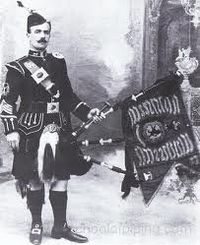Annotation:Kilworth Hills (The): Difference between revisions
No edit summary |
m Text replacement - "garamond, serif" to "sans-serif" |
||
| Line 1: | Line 1: | ||
'''Back to [[{{BASEPAGENAME}}]]''' | '''Back to [[{{BASEPAGENAME}}]]''' | ||
---- | ---- | ||
<p><font face=" | <p><font face="sans-serif" size="4"> | ||
'''KILWORTH HILLS, THE'''. Scottish, Retreat March (3/4 time). A Major. Standard tuning (fiddle). AABBCCDD. Composed by Pipe Major George S. McLennan [http://www.pipetunes.ca/composers.asp?pg=Details&composerID=20]. "The retreat march is not necessarily a march time tune which would be marched to," explains Stuart Eydmann; rather, "as often as not it was played as part of the evening ritual in military camps as day duties gave way to night ones. It was not linked to the military manoeuvre of retreating in or from battle but was linked to the idea of refuge and safety in the camp." | '''KILWORTH HILLS, THE'''. Scottish, Retreat March (3/4 time). A Major. Standard tuning (fiddle). AABBCCDD. Composed by Pipe Major George S. McLennan [http://www.pipetunes.ca/composers.asp?pg=Details&composerID=20]. "The retreat march is not necessarily a march time tune which would be marched to," explains Stuart Eydmann; rather, "as often as not it was played as part of the evening ritual in military camps as day duties gave way to night ones. It was not linked to the military manoeuvre of retreating in or from battle but was linked to the idea of refuge and safety in the camp." | ||
[[File:mclennan.jpg|200px|thumb|left|Pipe Major G.S. McLennan (1883-1929)]] | [[File:mclennan.jpg|200px|thumb|left|Pipe Major G.S. McLennan (1883-1929)]] | ||
| Line 10: | Line 10: | ||
<br> | <br> | ||
</font></p> | </font></p> | ||
<p><font face=" | <p><font face="sans-serif" size="4"> | ||
''Source for notated version'': | ''Source for notated version'': | ||
<br> | <br> | ||
<br> | <br> | ||
</font></p> | </font></p> | ||
<p><font face=" | <p><font face="sans-serif" size="4"> | ||
''Printed sources'': Martin ('''Ceol na Fidhle'''), vol. 2, 1988; p. 38. | ''Printed sources'': Martin ('''Ceol na Fidhle'''), vol. 2, 1988; p. 38. | ||
<br> | <br> | ||
<br> | <br> | ||
</font></p> | </font></p> | ||
<p><font face=" | <p><font face="sans-serif" size="4"> | ||
''Recorded sources'': <font color=teal></font> | ''Recorded sources'': <font color=teal></font> | ||
</font></p> | </font></p> | ||
Latest revision as of 13:47, 6 May 2019
Back to Kilworth Hills (The)
KILWORTH HILLS, THE. Scottish, Retreat March (3/4 time). A Major. Standard tuning (fiddle). AABBCCDD. Composed by Pipe Major George S. McLennan [1]. "The retreat march is not necessarily a march time tune which would be marched to," explains Stuart Eydmann; rather, "as often as not it was played as part of the evening ritual in military camps as day duties gave way to night ones. It was not linked to the military manoeuvre of retreating in or from battle but was linked to the idea of refuge and safety in the camp."

"Kilworth Hills" may have been McLennan's first composed tune. The piper's brother, in an interview on Radio Scotland's "Pipeline" program, said that the melody was based on a Russian song called "Stenka Razin", heard when warships from that country visited Leith around 1899. It appears that a pop song, "When the Carnival is Over", is also derivative of the Russian melody {Jack Campin} [2].
Source for notated version:
Printed sources: Martin (Ceol na Fidhle), vol. 2, 1988; p. 38.
Recorded sources:
Back to Kilworth Hills (The)
